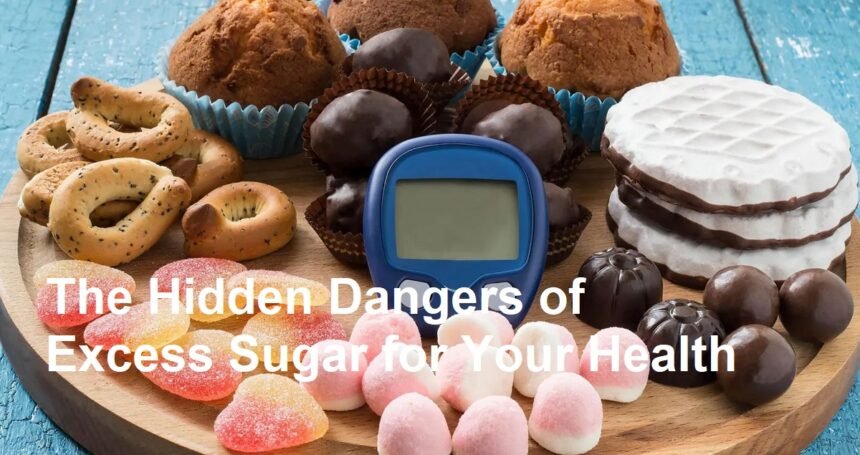Introduction
We all love a sweet treat now and then—cakes, sodas, or that tempting chocolate bar. But did you know that consuming too much sugar can harm your body in ways you might not realize? The dangers of excess sugar go far beyond just weight gain. It can affect your energy levels, skin, heart, and even raise your risk of diabetes.
In this article, we’ll break down how sugar impacts your body, how it affects heart health, why it increases diabetes risk, and give you simple, practical tips to reduce your sugar intake without feeling deprived.
Why Too Much Sugar Is a Problem
Sugar itself is not the enemy—your body needs natural sugars from fruits, vegetables, and whole grains to function. The problem comes when you consume added sugars from processed foods, sugary drinks, and desserts.
What Happens in Your Body?
- Sugar spikes your blood sugar quickly, giving you an energy rush.
- Your body produces insulin to bring it down, often leading to an energy crash.
- Over time, too much sugar causes insulin resistance, paving the way for diabetes and other health problems.
This cycle explains why the dangers of excess sugar are something we can’t ignore.
The Impact of Sugar on Your Health
1. Sugar and Weight Gain
Excess sugar adds empty calories to your diet. Drinks like soda, sweetened coffee, or energy drinks can add hundreds of calories without making you feel full. This often leads to overeating and, eventually, weight gain.
2. Sugar and Heart Health
High sugar consumption is linked to a greater risk of heart disease. Here’s how:
- It increases inflammation in the body.
- It raises triglyceride levels (a type of fat in your blood).
- It can lead to higher blood pressure.
Over time, these changes can damage your heart, making it weaker and more vulnerable.
3. Sugar and Diabetes Risk
One of the most serious sugar impacts is its connection to diabetes risk. Eating too much sugar consistently can cause insulin resistance, where your cells no longer respond properly to insulin. This increases blood sugar levels and, over time, leads to type 2 diabetes.
4. Sugar and Your Skin
Did you know sugar can speed up skin aging? High sugar intake triggers a process called glycation, which damages collagen and elastin—the proteins that keep your skin firm and youthful.
5. Sugar and Your Brain
While sugar gives you a temporary “high,” too much can cause mood swings, anxiety, and even affect memory. Studies show a high-sugar diet can increase the risk of depression.
Hidden Sources of Sugar You Might Not Notice
It’s not just candy and desserts you need to worry about. Many everyday foods contain hidden sugars.
Common Culprits:
- Breakfast cereals and granola bars
- Flavored yogurt
- Bottled sauces (ketchup, BBQ sauce)
- Packaged bread
- Sports drinks and energy drinks
Tip: Always check nutrition labels. If sugar (or corn syrup, fructose, sucrose, etc.) is one of the first ingredients, it’s likely loaded with added sugars.
How Much Sugar Is Too Much?
The World Health Organization (WHO) recommends that added sugars make up less than 10% of your daily calories, ideally closer to 5%.
For the average adult:
- That’s about 25 grams (6 teaspoons) of sugar per day.
- A single can of soda already contains more than this!
This shows just how easy it is to exceed the safe limit and face the dangers of excess sugar.
Practical Tips to Reduce Sugar Intake
1. Choose Natural Sweetness
Replace processed sweets with fruits. For example:
- Swap cookies for apple slices with peanut butter.
- Use bananas to naturally sweeten smoothies.
2. Drink More Water
Sugary drinks are one of the biggest sources of excess sugar. Replace them with water, herbal teas, or sparkling water with lemon.
3. Read Food Labels
Get into the habit of checking sugar content on labels. Look for words like corn syrup, dextrose, and maltose—these are all hidden sugars.
4. Cook at Home
Making meals at home helps you control what goes into your food. Try making your own sauces and dressings to avoid hidden sugar.
5. Cut Back Gradually
If you’re used to lots of sugar, don’t try to quit cold turkey. Start by cutting back slowly—reduce sugar in coffee, switch from flavored to plain yogurt, and choose snacks with less added sugar.
Healthy Alternatives to Satisfy Your Sweet Tooth
Natural Sweeteners (in moderation):
- Honey – Rich in antioxidants.
- Maple syrup – Contains small amounts of minerals.
- Stevia – A calorie-free option from natural plants.
Note: Even natural sweeteners should be used sparingly. The goal is to train your taste buds to enjoy less sweetness over time.
Long-Term Benefits of Cutting Back on Sugar
Once you start reducing sugar, you’ll notice improvements in both how you feel and how you look.
What You Can Expect:
- More stable energy throughout the day.
- Better weight management.
- Lower diabetes risk.
- Improved heart health.
- Clearer, healthier-looking skin.
- Better mood and mental focus.
The best part? Once your body adjusts, you won’t crave sugar as much anymore.
Conclusion
The dangers of excess sugar are something we all need to take seriously. From increasing your diabetes risk to harming your heart and even aging your skin faster, the effects of too much sugar can sneak up on you.
But the good news is: with small, consistent changes, you can take back control of your health. By being mindful of hidden sugars, choosing healthier alternatives, and cutting back step by step, you’ll set yourself up for a stronger, healthier future.
Are you ready to reduce your sugar intake and feel the difference in your body? Start today by making one small change—swap that soda for water, or choose fruit instead of cookies.











